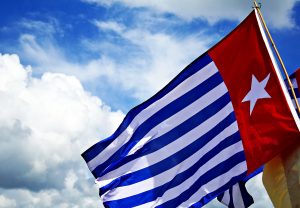Papuan separatist rebels have killed four government soldiers and wounded two others during a raid on a military post in the predawn hours of September 2, Indonesian military officials said.
Dozens of assailants believed to belong to the West Papua National Liberation Army (WPNLA), the military wing of the Free Papua Organization, stormed a post in Maybrat regency and attacked six soldiers with arrows, machetes, and other basic weapons, Hendra Pesireron, the spokesperson of the West Papua regional military command, said in a statement.
As provincial military commander Maj. Gen. I Nyoman Cantiasa told a separate news conference, “About 30 people or more believed to be separatist terrorists armed with machetes attacked the post in the early hours of Thursday, resulting in the deaths of four members of the Indonesian Army and two others suffering stab wounds.” Cantiasa added that he had deployed two platoons of soldiers “to hunt down the group” responsible for the attacks.
WPNLA spokesperson Sebby Sambom quickly claimed responsibility for the attack, the deadliest on state security forces this year in West Papua, one of two provinces which make up the unsettled Papua region in Indonesia’s east.
“Our militants under the orders of the West Papua Liberation Army supreme commander Goliath Tabuni are responsible for this morning’s attack,” he said in a statement yesterday. Sambom called on the government to negotiate with the Free Papua Organization (OPM). Otherwise, “The war will not stop,” he added. “It will continue in Papua as long as Indonesia is still occupying (Papuan) land.”
The attack follows the killing of two construction workers in Yahukimo regency, whose bodies were burned near a bridge project on August 23. Earlier this week, police arrested four suspected members of the WPNLA for the killings.
Papua was incorporated into Indonesia in 1969 on the basis of a U.N.-sponsored referendum – the Act of Free Choice – that Papuan nationalists say was very far from free. Since then, a low-level insurgency has persisted in the region, flaring up periodically in response to the exploitation of the region’s rich natural resources and the transmigration of thousands of people from other parts of the archipelago.
The situation in Papua has grown increasingly tense over the past few years, as separatist forces have launched violent and daring attacks on soldiers and civilians that it accuses of facilitating the region’s occupation, bringing a heavy-handed and disproportionate response from the Indonesian military.
In November, the regional U.N. Human Rights Office expressed its concern about the rash of violence and arrests that have taken place since 2018. “Military and security forces have been reinforced in the region and there have been repeated reports of extra-judicial killings, excessive use of force, arrest and continuous harassment and intimidation of protesters and human rights defenders,” the U.N. statement said.
The situation has worsened since April, when separatist fighters ambushed and killed Brig. Gen. Gusti Putu Danny Nugraha, the head of Indonesia’s intelligence agency in the eastern province. The assassination led the government to formally designate Papuan separatists “terrorists” and deploy additional troops to the region.
The campaign has resulted in deaths on both sides, dozens of arrests, and the mass displacement of Papuan villagers caught in the middle of the conflict. Then, in July, Jakarta renewed and amended a Special Autonomy Law that local activists say will increase Jakarta’s grip over the restive but resource-rich region.

































